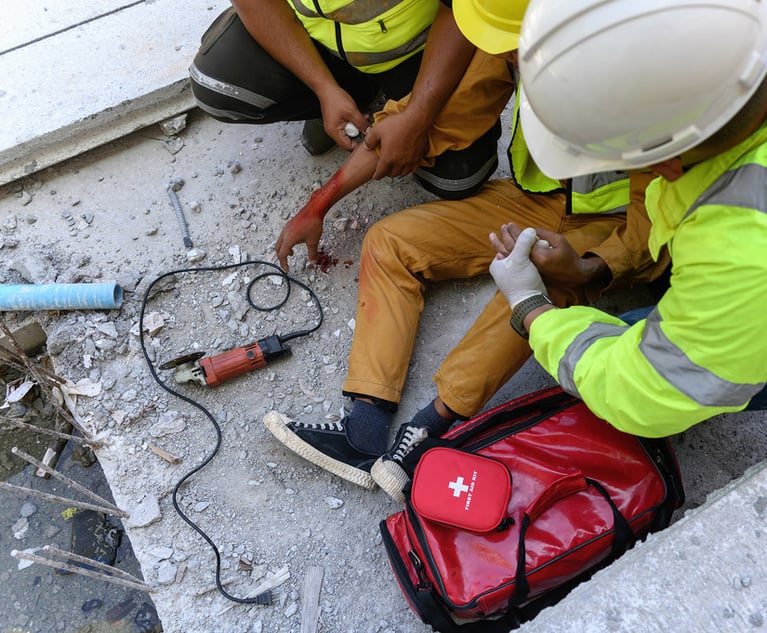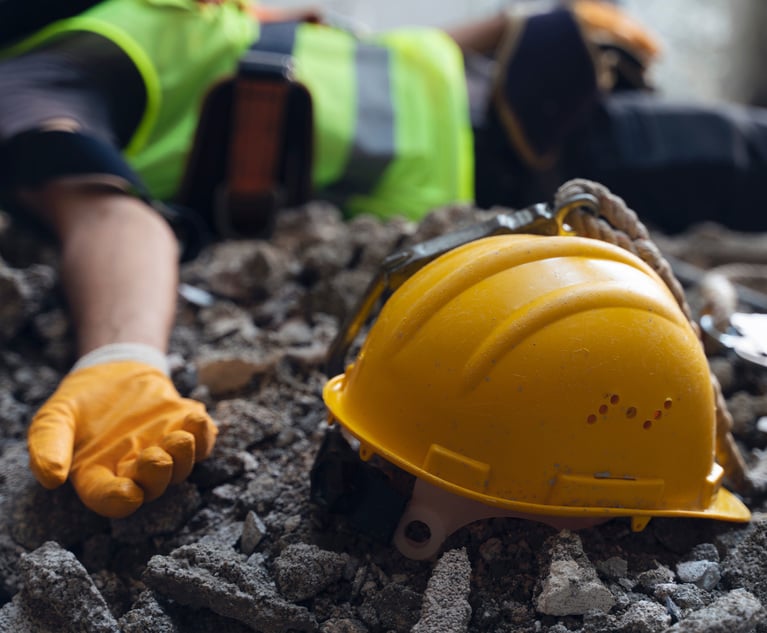Appeals Court Upholds $2.82 Million Verdict to Worker Injured at Meadowlands Racetrack
“Defendants assert the judge erred when she denied them a new trial because plaintiff's and defendants' negligence could not be 'unbundled.' We disagree,” wrote the judges.
April 24, 2019 at 01:14 PM
9 minute read
 Meadowlands Racing & Entertainment in New Jersey with live harness racing. Photo: Meadowlandsracetrack via Wikimedia Commons
Meadowlands Racing & Entertainment in New Jersey with live harness racing. Photo: Meadowlandsracetrack via Wikimedia Commons
A state appeals court upheld a $2.82 million verdict awarded to a roofer injured at the Meadowlands Racetrack, but also turned back the plaintiff's bid for added damages above that sum.
The Appellate Division on Tuesday affirmed the award to worker Washington Munoz, who was injured when an opaque rubber covering over a drainage hole on the roof caved under his weight and forced him to lose his balance and injure his back and arm.
The case was on appeal from Middlesex County Superior Court and argued March 27 before Appellate Division Judges Carmen H. Alvarez, William Nugent and Hany A. Mawla.
Superior Court Judge Andrea Carter entered judgment below, according to court records.
“Defendants assert the judge erred when she denied them a new trial because plaintiff's and defendants' negligence could not be 'unbundled.' We disagree,” wrote the judges in the per curiam opinion. “Negligence and proximate cause are separate and distinct elements, and are typically separate questions.
“Determining proximate cause requires a 'combination of logic, common sense, justice, policy and precedent' that fixes a point in a chain of events, some foreseeable and some unforeseeable, beyond which the law will bar recovery. Mere negligence does not necessarily equate with proximate cause,” the panel wrote. “Rather, the negligent act must be a 'substantial factor' in bringing about the injury.”
But they also affirmed the trial court's dismissal of Munoz's punitive damages and loss of future wages claims.
Named as defendants were the New Jersey Sports and Exposition Authority, New Meadowlands Racetrack LLC, LPCiminelli Inc., LPCiminelli RCCIP, and subcontractors Cooper Plastering Corp. and Paino Roofing Co. Inc., among others.
On Nov. 9, 2017, a jury found that subcontractors Ciminelli and Paino were negligent and their negligence was a proximate cause of the incident. They also found that Munoz was negligent too, but his negligence was not a proximate cause of the incident.
The jury apportioned 70 percent liability to Ciminelli and 30 percent to Paino. The jury awarded Munoz $2.4 million for pain, suffering, impairment, disability and loss of enjoyment of life; $104,671 in past medical bills; $150,000 for future medical expenses; and $235,248 for his past lost earnings.
Munoz's past medical bills were conformed to $35,318.19, pursuant to N.J.S.A. 2A:15-97, for a total verdict of $2.82 million.
The defendants, in appealing the denial of their motion for a new trial, argued to the appeals court that the sum of the award was excessive, Munoz suffered no life-altering injuries, broken bones, loss of bodily function or any extended hospitalization and has continued to perform the activities of daily living; and that his testimony did not demonstrate Munoz was unable to work, they said.
Gerald H. Clark of the Clark Law Firm in Belmar, who argued the case on behalf of Munoz, said Carter “was a careful judge who conducted a fair trial and correctly applied the law.”
“The Appellate Division recognized this in a well-reasoned, thorough opinion which is well-grounded in the record,” Clark said in an email on Wednesday. “We are honored and humbled by the part we played in bringing about justice for a worker who was needlessly injured because basic workplace safety rules were not followed.”
Timothy E. Burke of McElroy, Deutsch, Mulvaney & Carpenter in Morristown, who represented defendants, declined to comment on Tuesday's decision.
According to the decision, Munoz was a union employee of Cooper Plastering Corp., which was installing plaster on the roof of the Meadowlands Racetrack in East Rutherford.
Cooper Plastering was a masonry subcontractor hired by the construction manager, Ciminelli. The roof surface was flat and covered by a thin, flexible, rubber membrane, which had been installed by Paino, the roofing subcontractor, the court said.
The membrane covered at least two six-inch recessed roof drain holes, obscuring them from view. The construction plans required the rubber membrane to be cut and fitted around the drains on the roof, but this was not done at the time of the incident, the court said.
Munoz walked across the roof carrying two 60-pound buckets of plaster and a work bag filled with tools slung over his shoulder. Munoz, who had not previously been on the roof, looked down, not ahead, as he walked. As he stepped onto one of the covered drain holes, the rubber membrane gave way and caused him to lose his balance and twist in position, thereby causing his tool bag to slip down his arm, pulling his shoulder.
He testified he felt his body contort and experienced immediate pain in his arm and back.
Ciminelli's work-site policy required workers to report injuries the same day they occur. Munoz testified he did not immediately report the incident because no one from Ciminelli was present to take his report. The following day, Munoz said he notified his supervisor he had been hurt on the job.
“Thus, the facts demonstrated a reasonably prudent person acting without negligence would have stepped into the hole,” the Appellate Division panel wrote. “The facts do not prove—directly or circumstantially—plaintiff's negligence was the proximate cause of his own injuries. The trial judge's decision to deny defendants a new trial was sound.”
Munoz's expert noted during trial that the rubber membrane that covered the drain hole could not bear Munoz's weight. Munoz's treating orthopedic surgeon testified that Munoz sustained a serious injury to his back and shoulder as a result. Specifically, Munoz had a torn rotator cuff, a ruptured disc, a displaced biceps tendon, among other injuries, according to the decision.
Although Munoz underwent two surgical procedures, his doctor testified that the rotator cuff tear had worsened and required another surgery.
Munoz's doctor classified his injuries as “permanent” and noted he remained in treatment for ongoing pain. He also testified Munoz would have a “Popeye sign” or “very obvious” deformity on his arm.
The defense countered and provided video testimony from its own medical expert who testified that Munoz “had torn [the] right biceps tendon” as a result of the accident. However, the expert claimed the rotator cuff tear occurred after the surgery and was unrelated to the accident.
Munoz also presented video testimony from a psychologist who testified on his alleged inability to work, provide for his family, and enjoy athletics and recreation like he had prior to the work injury. The psychologist testified that he diagnosed Munoz with major depressive disorder caused by the injury. She recommended psychotherapy and possible treatment with antidepressants to prevent his mental health from further spiraling down.
Munoz presented evidence he incurred $104,671.14 in past medical bills. His doctor estimated Munoz would incur $25,000 in future orthopedic treatment costs. His psychologist estimated that, given his life expectancy, Munoz would incur $170,000 in psychotherapy expenses and, if required, $221,000 in psychopharmacological treatment.
The court said Munoz earned $39 per hour working for Cooper on a full-time basis, with occasional overtime, prior to the accident. He presented a pay stub, which showed gross earnings of $1,606.80 and $1,150.68 in net pay per week.
Munoz testified he was unable to work in construction after he was injured, having limited earnings of approximately $4,000 for unspecified construction work.
During trial, Munoz presented testimony from a workplace safety expert who concluded Ciminelli and Paino had a non-delegable duty to maintain the work site in safe condition, which included the duty to perform safety inspections, correct hazards and otherwise assure job site conditions were in compliance with federal Occupational Safety and Health Administration (OSHA) standards.
An expert on his behalf cited Ciminelli's safety manual, which stated “contractors are ultimately responsible for the safety of their own employees and any of their subcontractors on the jobsite,” and the contract between subcontractors Ciminelli and Paino held Paino responsible for the safety of its employees.
Plaintiffs counsel's reference to the safety manual during summation was raised as an issue on appeal. The Appellate Division said: “Plaintiff's comments derived from Ciminelli's safety manual whose summary read as follows: It is your finger, your eye, and your life that we are concerned about. They are irreplaceable. Your means of livelihood is diminished, or at worst destroyed, when you are disabled. You and your family are the people to suffer the most. Safety rules help protect you.'”
“Thus, read in context, counsel's comments were not clearly capable of producing an unjust result,” they stated. “The summation did not constitute reversible error. “
The court also sided with the trial judge that the jury award to Munoz was not excessive.
“The jury's award may have been substantial, but it does not shock the conscience or represent a miscarriage of justice under the facts presented. The evidence in the record showed plaintiff experienced significant detrimental changes in many facets of his life. He could not engage in leisure, social, or work activities as he had done before the accident,” wrote the judges.
“For these reasons, the trial judge's decision declining to disturb the jury award was not an error.”
The panel ruled that future medical expenses and Munoz's past wages are permissible where they “can be calculated objectively and without difficulty.”
“We conclude the award was supported by credible evidence and was neither speculative nor grounds for a new trial,” said the judges.
Munoz filed a cross-appeal of the below judge's dismissal of claims for future lost wages and punitive damages, but the Appellate Division rejected the cross-appeal.
This content has been archived. It is available through our partners, LexisNexis® and Bloomberg Law.
To view this content, please continue to their sites.
Not a Lexis Subscriber?
Subscribe Now
Not a Bloomberg Law Subscriber?
Subscribe Now
NOT FOR REPRINT
© 2025 ALM Global, LLC, All Rights Reserved. Request academic re-use from www.copyright.com. All other uses, submit a request to [email protected]. For more information visit Asset & Logo Licensing.
You Might Like
View All

Dispute Resolution Boards—Getting Real Time Decisions on Construction Projects
7 minute read
Insurer Has No Duty to Defend 'Laidlow' Claims, NJ Supreme Court Says
3 minute read
Construction Worker Hit by Falling Concrete Settles Claims for $2.3M
4 minute readTrending Stories
- 1'A Death Sentence for TikTok'?: Litigators and Experts Weigh Impact of Potential Ban on Creators and Data Privacy
- 2Bribery Case Against Former Lt. Gov. Brian Benjamin Is Dropped
- 3‘Extremely Disturbing’: AI Firms Face Class Action by ‘Taskers’ Exposed to Traumatic Content
- 4State Appeals Court Revives BraunHagey Lawsuit Alleging $4.2M Unlawful Wire to China
- 5Invoking Trump, AG Bonta Reminds Lawyers of Duties to Noncitizens in Plea Dealing
Who Got The Work
J. Brugh Lower of Gibbons has entered an appearance for industrial equipment supplier Devco Corporation in a pending trademark infringement lawsuit. The suit, accusing the defendant of selling knock-off Graco products, was filed Dec. 18 in New Jersey District Court by Rivkin Radler on behalf of Graco Inc. and Graco Minnesota. The case, assigned to U.S. District Judge Zahid N. Quraishi, is 3:24-cv-11294, Graco Inc. et al v. Devco Corporation.
Who Got The Work
Rebecca Maller-Stein and Kent A. Yalowitz of Arnold & Porter Kaye Scholer have entered their appearances for Hanaco Venture Capital and its executives, Lior Prosor and David Frankel, in a pending securities lawsuit. The action, filed on Dec. 24 in New York Southern District Court by Zell, Aron & Co. on behalf of Goldeneye Advisors, accuses the defendants of negligently and fraudulently managing the plaintiff's $1 million investment. The case, assigned to U.S. District Judge Vernon S. Broderick, is 1:24-cv-09918, Goldeneye Advisors, LLC v. Hanaco Venture Capital, Ltd. et al.
Who Got The Work
Attorneys from A&O Shearman has stepped in as defense counsel for Toronto-Dominion Bank and other defendants in a pending securities class action. The suit, filed Dec. 11 in New York Southern District Court by Bleichmar Fonti & Auld, accuses the defendants of concealing the bank's 'pervasive' deficiencies in regards to its compliance with the Bank Secrecy Act and the quality of its anti-money laundering controls. The case, assigned to U.S. District Judge Arun Subramanian, is 1:24-cv-09445, Gonzalez v. The Toronto-Dominion Bank et al.
Who Got The Work
Crown Castle International, a Pennsylvania company providing shared communications infrastructure, has turned to Luke D. Wolf of Gordon Rees Scully Mansukhani to fend off a pending breach-of-contract lawsuit. The court action, filed Nov. 25 in Michigan Eastern District Court by Hooper Hathaway PC on behalf of The Town Residences LLC, accuses Crown Castle of failing to transfer approximately $30,000 in utility payments from T-Mobile in breach of a roof-top lease and assignment agreement. The case, assigned to U.S. District Judge Susan K. Declercq, is 2:24-cv-13131, The Town Residences LLC v. T-Mobile US, Inc. et al.
Who Got The Work
Wilfred P. Coronato and Daniel M. Schwartz of McCarter & English have stepped in as defense counsel to Electrolux Home Products Inc. in a pending product liability lawsuit. The court action, filed Nov. 26 in New York Eastern District Court by Poulos Lopiccolo PC and Nagel Rice LLP on behalf of David Stern, alleges that the defendant's refrigerators’ drawers and shelving repeatedly break and fall apart within months after purchase. The case, assigned to U.S. District Judge Joan M. Azrack, is 2:24-cv-08204, Stern v. Electrolux Home Products, Inc.
Featured Firms
Law Offices of Gary Martin Hays & Associates, P.C.
(470) 294-1674
Law Offices of Mark E. Salomone
(857) 444-6468
Smith & Hassler
(713) 739-1250






